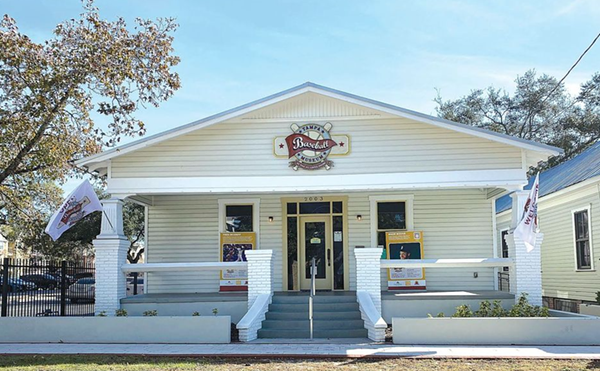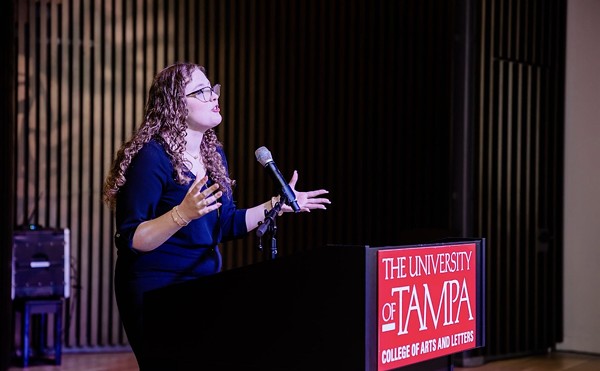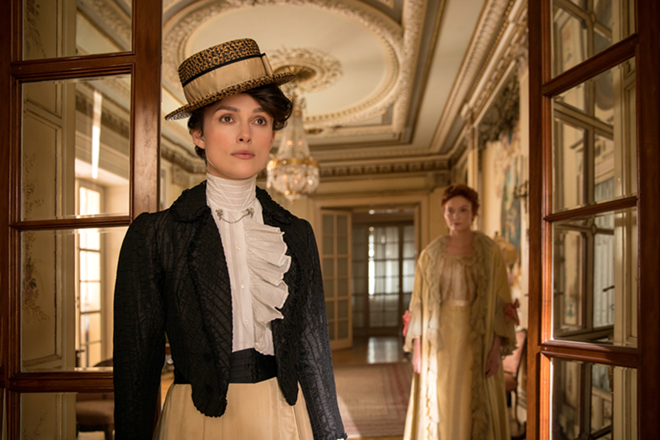
Colette is a beguiling film, lush and literate, absorbing in its period detail, inspiring in its female-driven narrative and feminist hero, and enthralling in Keira Knightley and Dominic West’s nuanced and knowing performances.
Sidonie-Gabrielle Colette (Keira Knightley) grows up a provincial country girl in rural France in the 1870s and '80s. She falls for a man 14 years older than she, successful Parisian writer and publisher Henry Gauthier-Villars, known as “Willy” (Dominic West ), a notorious libertine who takes his new bride to the glorious artistic and intellectual life of fin-de-siècle Paris. Their marriage is shattered by his philandering, but all is forgiven when he convinces her they can form an equal partnership in which she’ll be a ghostwriter, but the books will have his name on the title page. Women were not permitted to write or publish, and certainly not write and publish books with characters notable for their sexual expression and defiance of gender roles.
Her/his first book is Claudine at School, the story of a country schoolgirl who’s gutsy, adroit, and sensuous. It has more than a hint of adolescent same-sex exploration, and becomes a bestseller and cultural sensation. Willy sees his future — to have Colette crank out the novels, even if it means literally locking her in her room for hours at a time and forcing her to write. Soon follows Claudine in Paris and Claudine Married. All are wildly popular, so much so that Claudine becomes one of the first marketing tie-ins in modern literature with Claudine shampoo, Claudine cigarettes, Claudine clothing, and more. Colette meets herself as Claudine on the streets as women everywhere are dressing as the fictional Claudine. She’s a brand, and Willy and Colette are one of the first celebrity couples, the toast of the Belle Époque.
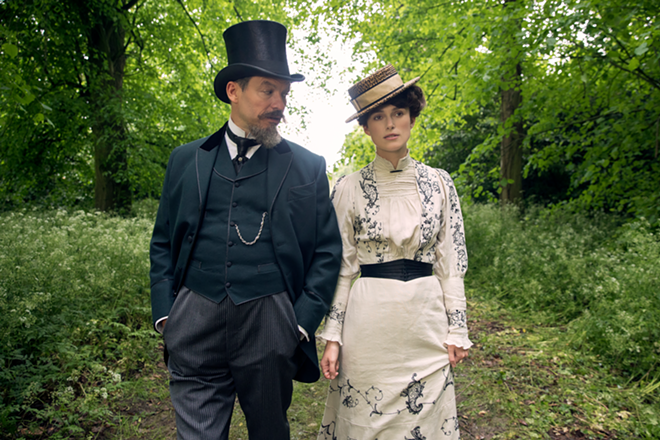
But there’s a fly in this ointment: Willy is increasingly demanding and controlling, and Colette is increasingly aware of her same-sex attractions, first to Georgie Raoul-Duval (Eleanor Tomlinson of Poldark), a flirty Southern belle from Louisiana who is also attracted to Willy. There are times when Georgie sees Colette in the morning and Willy in the afternoon, though unbeknownst to Colette. When that’s discovered, Colette writes the next Claudine novel, Colette and Annie, a thinly disguised account of the erotic triangle. Paris isn't exactly scandalized — more like fascinated and intrigued. Book sales increase. Colette even takes on a music hall role, defying cultural propriety and breaking convention as she exposes her breast on stage when most of proper society were still discussing whether a woman’s ankles should be revealed, and shares an onstage kiss with another woman. The music hall explodes in a brawling riot. Fun times.
Then Colette meets the Marquise de Belbeuf, or “Missy” (Denise Gough of Angels in America), a nonconformist aristocrat who wears men’s clothes and embraces a masculine identity. Even her wearing trousers violates French law, so it’s a transgressive relationship, and transformative too, from the very beginning. Willy and Missy’s variations on masculinity and their simultaneous attractions for Colette reveal the intricacies of their lives and complexities of this film.
Emboldened by Missy’s example, Colette challenges Willy, fighting for ownership of her creative voice. As Colette declares to Willy, “I’m planning on killing Reynaud (the thinly veiled Willy in these autobiographical novels) off in the next one,” reminding him of what he once said: “The hand that holds the pen writes the history.” Indeed.
Wash Westmoreland wrote and directed this film with passion and elegance. It’s been a long time since I’ve seen a film that was so conscious of its literary heritage and its celebration of the writer’s craft. Giles Nuttgens’ cinematography of 19th-century France (though rural exteriors filmed in Hungary copied Paris, right there in Budapest) is gorgeous and lyrical. There’s only so much you can do to show a writer at work, but at least we do have beautiful fountain pens with nibs dipped in miniature jars of India ink scratching their way in flowing French across the creamy page, all lit by candle and suffused in golden light.
The screenplay, by Westmoreland, his late husband Richard Glatzer and Rebecca Lenkiewicz, conjures a world that enchants us from start to finish, whether it’s the opening scene of Colette moving voluptuously in her sheets on being awakened by a stretching cat, or a Parisian drawing room scene featuring a bejeweled turtle encrusted with precious gems, or a tight close-up of Colette’s black ink dripping onto textured paper, like generative black semen, as she pens the novel that will make her fame and fortune. Then there’s the furious and fiery confrontation between Colette and Willy when she conveys magnificently both her ferocious feminine and masculine selves. Willy may be a leech and chauvinistic manipulator, but he’s incredibly likable, and his and Colette’s embrace of scandal and monetizing their celebrity status really does usher in the modern age.
Knightley and West are masterful conveyers of this fraughted and freighted marriage, equal parts love and exploitation.
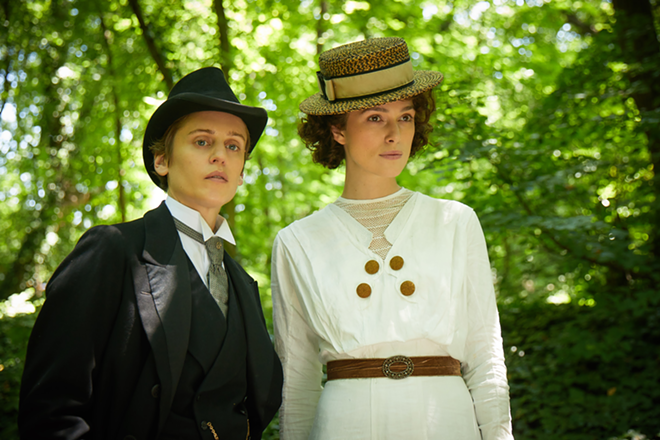
There was a progressive casting philosophy throughout, reinforcing Colette’s own gender-bending, convention-defying life. Westmoreland cast actor Jake Graf, a trans man, to play a cisgender character, Gaston De Vaillavet, and he cast Rebecca Root, a trans woman, to play a cisgender woman, the famous novelist Rachilde. Ray Panthaki, Asian-British, plays Pierre Veber, who was white in real life. Johnny K. Palmer, a black actor, plays another white figure, Paul Heon, the publisher’s typewriting secretary.
And it's funny, too. When Colette figures out Willy's errant ways with women in practically every Paris arrondissement, she says, "I can read you like the top line at an optometrist's office." And once when Willy sheepishly visits Colette, who's retreated to her mother’s country home in light of her husband's philandering, he slinks into the kitchen while the women are vigorously and loudly chopping vegetables, muttering, "Very Greek... all those knives."
You really could not ask much more of a film that reveals the life of the most important woman in all of French literature, though most Americans know her, if at all, as the writer of the book that became the basis of Broadway’s and Hollywood’s Gigi with Maurice Chevalier creepily singing “Thank Heaven for Little Girls.”
Increasingly, Colette’s work is part of the feminist and LGBTQ literature canon as she is a beacon to those who must survive in a heteronormative male world. When Willy walks into a social setting, his pointed beard in full-strutted manhood at its most entitled, it’s as if his perpetual erection enters the room first. It’s not for nothing that one of the earliest symbolic indicators of Willy’s priapic dominance is his gift to her of a newly built and obviously phallic Eiffel Tower in a snow globe, suggesting the girlish Colette turn the globe over in her hands and watch the snow fall around the tower.
Far ahead of her time, Colette refused that male domination and entitlement, rejected the subservient role of wife and mother, established her own artistic and financial independence, and inhabited her own proud queer identity.
Wisely, this film does not impose ahistorical, anachronistic terminology on these relationships. Nobody is bothered by a coming-out scene. Nobody tiptoes in a closet. Nobody has to explain to a husband or wife what they might do extra-maritally, or who does what to who and where. Nobody has to use the gay or lesbian label. Nobody talks about fluid sexuality. Nobody suggests anything is unnatural. Nobody tries to explain whether Missy is a man or a woman, though the closest we come is Willy’s comment, “Words are either masculine or feminine. There’s no word for someone like Missy.” Their identities are merely ordinary declarations, not jailable offenses.
With the epilogue in Colette’s own words, a woman nominated for the Nobel Prize in Literature — “What a wonderful life I’ve had. I only wish I’d realized it sooner.” — see this movie and you will marvel how wonderful indeed her life was, as is this film.
Ben Wiley taught literature and film at St. Petersburg College. At USF/Tampa, he was statewide Director of the Florida Consortium/University of Cambridge (UK) International Summer Schools. His interests are film, theater, books, and kayaking Florida rivers. He also writes the BookStories feature in Creative Loafing Tampa. Contact him here.








